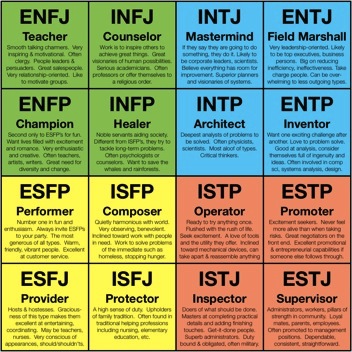-
You are currently viewing our forum as a guest, which gives you limited access to view most discussions and access our other features. By joining our free community, you will have access to additional post topics, communicate privately with other members (PM), view blogs, respond to polls, upload content, and access many other special features. Registration is fast, simple and absolutely free, so please join our community today! Just click here to register. You should turn your Ad Blocker off for this site or certain features may not work properly. If you have any problems with the registration process or your account login, please contact us by clicking here.
Frequently asked questions
About this site
What Is Personality Type (or Traits)?

We all have habitual patterns of thinking/cognition. Personality type (or traits) attempts to capture these habitual attitudes, preferences or ways of orienting of our psyche via some functions over others. The best way to think about it is that it provides a little bit of information about you as a person.
There are many different systems out there and new ones are being created as time goes on. Some die out. Others gain acceptance and as more is written about them and professional certifications are created related to testing instruments. Some examples of systems that describe personality type or traits include the Myers Briggs Type Indicator, Eneagram, Socionics, Gallup StrengthsFinder, Big 5, and DISC. On this forum, the two most popular ones are based on Jungian Cognitive functions (e.g., MBTI™) and Enneagram. There is a wealth of information available about both, which provides a rich set of information for practical use. HR consultants, personal coaches, counselors and others use these systems as a tool in their profession.
These systems have a variety of practical uses or applications but the primary ones are that they provide tools for you to:
- Understand yourself better
- Understand others better
- Understand the dynamics behind conflict between individuals
- Understand how different types can complement each other
- Provide a better understanding of one's type's typical weaknesses, and how to compensate
- Provide a more precise template for discovering how you don't (and do) follow the patterns of your type
- Support personal development
- Facilitate more effective communication and interaction
What Personality Type (or Traits) Is Not
Our DNA, our surroundings, the culture we live in, our life experience and choices – these things help to shape us as individuals. Personality type or traits are merely one way to aid in understanding. The best way to think about it then is that type can provide information or data points about us as individuals. Your type is not a complete and precise definition of you, your true self, and all that you are or can be. In practice there are a limited number of types, and at best each is a general pattern or template. Traits (such as Big 5) measure personality characteristics on a spectrum. You, as an individual, will never match any given type precisely in every detail. Keep in mind the idea "best fit," rather than "perfect fit." Even so, it may be that two types describe you equally well and you may have to flip a coin to decide, or you may just accept that there's not even a "best fit" type for you. Also, your type is not a way to confer virtues and abilities you wish you had. Deciding on a type will not make you suddenly insightful, selfless, powerful, strong, sensitive, or intelligent. Nor will it, conversely, make you weak and vulnerable. Finally, your type is not a way to excuse all your shortcomings as forgivable and/or unchangeable. You don't get to opt out of areas of life "because you are an INTP" or "because you are an enneagram type 4." We all have to find a balance between who we are and how to successfully adapt to our environment. While your type may allow you step down from judging yourself overly harshly for a particular shortcoming, your type is not a "get out of jail free" card.
Introductory Videos On Personality Type
The following are some good links to introductory videos. If any of them seem too dense or complicated, just skip to the next link :).
Introduction To Personality TypeIntroduction To Enneagram
Introversion/Extraversion Primer
Jungian Typology Tutorials
Function Attitudes Explanation
Good Books About Personality Type
There are a variety of good books out there as well. You'll get some of the best information by reading them. Some good introductory ones are:
Best Introductory Books on MBTI and Cognitive Functions
Gifts DifferingFunctions of Type - Activities To Develop The Eight Cognitive Functions
Personality Type - An Owners Manual
Was That Really Me? How Everyday Stress Brings Out Our Hidden Personality
Best Introductory Enneagram Books
The Enneagram - Helen PalmerWisdom Of The Enneagram - Riso/Hudson
Personality Type Profiles
Finally, check out the Type Profile Threads for more information about each of the Enneagram and MBTI types.
16 MBTI Type ProfilesEnneagram Type Profiles
- Created:
